Fiat Fiorino
| Fiat Fiorino | |
|---|---|
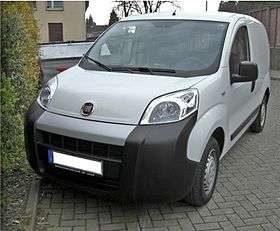 Fiat Fiorino 2008 | |
| Overview | |
| Manufacturer | Fiat |
| Production | 1977–present |
| Chronology | |
| Predecessor | Fiat 500 Commerciale |
The Fiat Fiorino is a small commercial vehicle produced by the Italian manufacturer Fiat since 1977. Its first two generations have been the panel van derivatives of other small models, such as the Fiat 127 and Fiat Uno, while the current third generation was developed jointly with PSA Peugeot Citroën, and is based on the Fiat Small platform.
The current generation, the Sevel LAV, is also built with a passenger body style, as the Fiat Qubo, and is marketed along its rebadged versions, the Citroën Nemo and the Peugeot Bipper. It is positioned below the Fiat Doblò, the Citroën Berlingo and the Peugeot Partner, in each manufacturer's model line-up.
The name comes from an old Italian coin, normally translated into English as the Florin.[1]
First generation (1977–1988)
| First generation | |
|---|---|
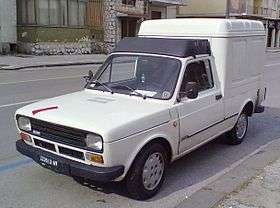 | |
| Overview | |
| Also called |
Fiat 127 Fiorino Fiat 147 Pick-Up City (Brazil)[2] Emelba 127 Poker |
| Production |
1977–1988 1989–1995 (Argentina) |
| Assembly |
Mirafiori, Turin, Italy Betim, Brazil (Fiat Automóveis) Córdoba, Argentina (Sevel) Catalonia, Spain (Emelba) |
| Body and chassis | |
| Class |
Leisure activity vehicle/panel van pick-up |
| Layout | Front-engine, front-wheel-drive |
| Related |
Fiat 127 Fiat 147 SEAT 127 |
| Powertrain | |
| Engine |
903 L 100 GL.000 OHV I4 petrol 1.049 L 127 A.000 OHC I4 petrol 1.301 L 127 D.000 SOHC I4 diesel |
| Dimensions | |
| Length | 3,835 mm (151.0 in) |
| Width | 1,564 mm (61.6 in) |
| Height | 1,810 mm (71.3 in) |
| Curb weight | 870 kg (1,918 lb) |
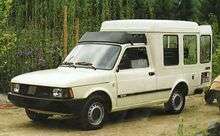
Originally called Fiat 127 Fiorino, the first version was based on the design of Series 2 Fiat 127 with the back being a van box, i.e. a 1.3 metres (4 ft 3 in) tall "high cube" design,[1] an arrangement subsequently emulated by several European auto makers. The platform is a stretched version of the Brazilian 147 with different rear suspension.
It was launched in early November 1977, in panel van and passenger (Panorama) version with the same 903 L (100 GL.000) OHV I4 petrol engine and the 1.050 L (127 A.000) OHC I4, both used in the Fiat 127. [1]
In 1981, Fiat introduced a facelift with new front fascia, similar to the similar to the Fiat 147 and the 127 Panorama; the 903 L engine was dropped and the new 1.301 L SOHC I4 diesel engine was introduced together the pick up version based on the stretched platform of the Brazilian Fiat 147 city pick up.
At the same time, Fiat dropped the name 127 in Europe, and called the vehicle Fiorino. [2] In 1980, the Fiorino was launched in Brazil in panel van version, passenger version and pick up. Another facelift was launched in 1983, with the new front grille based on the South American Fiat 127 Unificata.
In Europe, Fiat sold the kit "Ognitempo", to transform the Fiorino into a mini camper.
The Fiorino was assembled from 1977 to 1981 in Mirafiori factory, Italy, alongside the Fiat 127. In 1980, Fiat started production in Minas Gerais plant, Brazil were the Fiat 147 (and related 127 Panorama) was manufactured and in 1981 transferred the european production from Mirafiori to Minas Gerais.
After Brazilian production ceased in 1988, the assembly line of Fiorino transferred in Argentina and continued to be manufactured by Sevel Argentina, and sold for the local market. 25,035 units of the first generation were built in the Cordoba factory between 1989 to 1995. [3]
Spanish version

In Spain, a commercial vehicle based on the SEAT 127 (a Spanish version of the italian 127 built under license Fiat by SEAT) was produced from 1980 by coachbuilder Emelba and called the Emelba 127 Poker. [4] The 127 Poker have a similar "high cube" box design of the Fiorino, but different rear doors, rear lights and the platform have a different rear suspension.
The 127 Poker was design by Elba Design studio and was available as a panel van, passenger version and pick-up with the 903 L Fiat petrol engine, and was sold in Spain by the SEAT dealerships. Production ended in 1986, when was replaced by the SEAT Terra, which shares the same engine as the SEAT 127. The Spanish 127 Poker was built in the headquarters of coachbuilder Emelba, based in Province of Girona, Catalonia.
Engines
| Model | Engine | Displacement | Power | Torque | Note |
|---|---|---|---|---|---|
| 0.9 8V petrol | I4 | 903 cc | 45 PS (33 kW; 44 hp) | 64 N·m (47 lb·ft) | |
| 1.05 8V petrol | I4 | 1049 cc | 50 PS (37 kW; 49 hp) | 77 N·m (57 lb·ft) | |
| 1.3 8V diesel | I4 | 1301 cc | 45 PS (33 kW; 44 hp) | 103 N·m (76 lb·ft) |
Second generation (1988–2000)
| Second generation | |
|---|---|
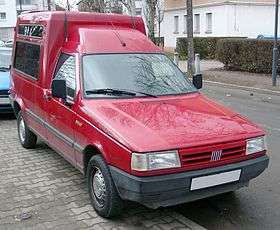 | |
| Overview | |
| Also called | Fiat Fiorino Panorama |
| Production |
1988–2000 (Europe) 1988–2013 |
| Assembly |
Betim, Brazil (Fiat Automóveis) Córdoba, Argentina (Sevel) |
| Body and chassis | |
| Class | Leisure activity vehicle (M) |
| Body style |
panel van pick-up |
| Layout | Front-engine, front-wheel-drive |
| Platform | Type One (Tipo Uno) |
| Related |
Fiat Uno/Mille (146) Fiat Duna/Penny/Elba |
| Powertrain | |
| Transmission |
4-speed manual 5-speed manual |
| Dimensions | |
| Wheelbase | 2,580 mm (102 in) |
| Length | 4,160 mm (163.8 in) |
| Width | 1,620 mm (63.8 in) |
| Height | 1,920 mm (75.6 in) |
| Kerb weight | 995 kg (2,194 lb) |
| Chronology | |
| Successor | Fiat Doblò |
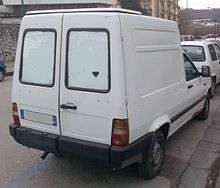
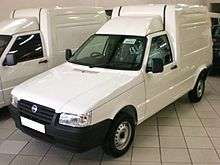
In 1988, a more modern version was released, based on the Brazilian Fiat Uno. Second generation Fiorino was made also as Panorama (passenger version) and pick up body styles. The Fiorino for the European market sold over 250,000 units until the end of 2000. In Europe, it was a great success, especially as a panel van version.
The United Kingdom's last year of Fiorino importation was 2001, a year after production ceased in Europe. Sales ended in Europe in December 2000.
In 1992, a facelifted Fiorino debuted, with a new style inspired by the Fiat Tipo,[5] and it received re engineered platform, new interior and more ecological engines. The last facelift for the European market was introduced in 1997.
In 1994, a new version based on the Fiat Mille (an economy version of the old European Uno) platform deputed in South America. This version assembled in Minas Gerais plant remained on sale in Brazil, Paraguay, Argentina and Chile until the end of 2013, in anticipation to the requirement for dual SRS airbags and ABS brakes in the Brazilian market from 2014 onwards.
ABS and driver SRS airbag had been available as extra cost options for the second generation Fiorino from the end of 1998 to 2001, but since the dashboard would not fit a passenger airbag without extensive changes, it was more cost effective to phase it out and replace with a newer generation.
The Fiorino second generation was also assembled in Argentina earlier. Over 1,000,000 Fiorinos has been sold in the South America. In 2004, an new facelift version was released with a Fiat Doblò front style. In 2009, Fiat introduced a new version, with new the red Fiat logo in the front of the car.
Production of the second generation of Fiorino in Brazil was dropped in December 2013, when the new generation was unveiled based on the same platform of the new Brazilian Fiat Uno (also called "Novo Uno", Type 327). The Fiorino was the leader of the segment for twenty three consecutive years.[6]
Engines
The engines are the Fiat 1.7L 8V diesel naturally aspirated or turbocharged, the 1.2L and the 1.4L 8V Fire petrol and for the South America the Flex engine 1.0L and 1.5L 8V. In Brazil, both 1242 cc engines are currently available as flexible fuel technology, working on both gasoline and ethanol.
- 1.0L gas
- 1.2L Fire
- 1.4L petrol
- 1.5L gas (ver. spi and mpi)
- 1.7L diesel and turbodiesel
Third generation
Europe (2007–present)
| Third generation | |
|---|---|
|
Fiat Fiorino, one of the three versions of the Sevel LAV | |
| Overview | |
| Manufacturer | Sevel |
| Also called |
Fiat Qubo Citroën Nemo Peugeot Bipper |
| Production | 2007–present |
| Assembly | Turkey: Bursa (Tofaş) |
| Body and chassis | |
| Class | Leisure activity vehicle (M) |
| Layout | Front-engine, front-wheel-drive |
| Platform | GM Fiat Small platform |
| Related |
Fiat Grande Punto Fiat Linea Opel Corsa D |
| Powertrain | |
| Engine |
1.4 L I4 (petrol)[nb 1] 1.4 L I4 (petrol/CNG)[nb 2] 1.3 L I4 (diesel) 1.4 L I4 (diesel)[nb 3] |
| Transmission |
5-speed manual 6-speed manual 5-speed semi-automatic 6-speed semi-automatic |
| Dimensions | |
| Wheelbase |
Fiat: 2,513 mm (98.9 in) Citroën/Peugeot: 2,510 mm (99 in) |
| Length |
Fiat: 3,864–3,964 mm (152.1–156.1 in) Citroën/Peugeot: 3,860 mm (152 in) |
| Width |
Fiat: 1,716 mm (67.6 in) Citroën/Peugeot: 1,710 m (67,000 in) |
| Height |
Fiat: 1,721 mm (67.8 in) Citroën/Peugeot: 1.720 m (67.7 in) |
| Kerb weight | 1,165 kg (2,568 lb) |
The third generation Fiat Fiorino (Type 225) leisure activity vehicle was unveiled in October 2007, and went on sale in February 2008. The Fiorino shares architecture and body work with the Citroën Nemo and Peugeot Bipper under the Sevel joint venture between Fiat and PSA Peugeot Citroën. Production began in November 2007.
Built by Tofaş in Bursa, Turkey, they are produced in both panel van and passenger body styles, and are situated below the larger LAVs Fiat Doblò, Citroën Berlingo and Peugeot Partner, in their manufacturers' line ups. Fiat also retails its passenger model as the Fiat Qubo, with the Fiorino name designating the commercial panel van models.
The Fiorino and its siblings are based on the Fiat Grande Punto platform, with a wheelbase of 2,513 millimetres (98.9 in). This project can be seen as a breakthrough in Tofaş history as it carried most of the development work in addition to responsibility for its assembly.
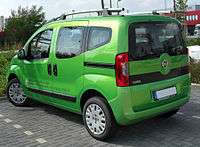
Fiat launched their passenger carrying equivalent at the Geneva Motor Show in March 2008. It is branded as the Fiat Qubo.
A derivative of the Fiorino (a small MPV), a passenger version of Fiorino was unveiled in June 2008. This version is suitable for up to five people and can be equipped with different engines, including a 1.3 Multijet diesel (75 PS) or 1.4 litre petrol engine with 73 PS (54 kW; 72 hp). The choice of gearboxes is either a five speed manual or a six speed automatic. In some countries (such as Turkey), this car is simply sold as the "Fiorino".
The Fiat Fiorino Cargo Electric is produced by Micro-Vett.
Citroën Nemo

The Citroën Nemo is a badge engineered van launched in January 2008 by Citroën.[8] The vehicle is the result of a partnership between Fiat, PSA Peugeot Citroën and Tofaş. The other platform derivatives are the Peugeot Bipper and the Fiat Fiorino.
The Citroën Nemo Multispace is a small MPV also introduced in 2008 and based on the same platform.
In April 2010, during a routine evasive manoeuvre test, conducted in Germany, the vehicle rolled over. The shape of the vehicle; as a high bodied, short wheelbase van caused the roll. The addition of Electronic stability control (ESC) would likely have prevented this but was not available as standard or as an option on the Nemo.[9]
Peugeot Bipper

The Peugeot Bipper is a small delivery van sold by French automaker Peugeot since May 2008.[8] It shares its body, platform and most components with the same generations of the Citroën Nemo and Fiat Fiorino.
The Citroën Nemo, Fiat Fiorino III and Peugeot Bipper were developed jointly with Tofaş, following a cooperation agreement signed on 31 March 2005. The vans are manufactured on behalf of all the partners in Bursa by Tofaş.
The claim is advanced that the Bipper a "mini cargovan" designed for big and small cities, cheaper and a little smaller than the Peugeot Partner. It is asserted that the little van is easy to park, handy for deliveries, and faster than competitor vehicles.
The Peugeot Bipper Tepee is a small MPV also introduced in 2008 and based on the same platform.
Engines
| Name | Fuel | Engine type | Volume | Output | Engine code | Emission standard | CO2 emissions (g/km) | Notes |
|---|---|---|---|---|---|---|---|---|
| 1.4 8V | Gasoline | 4 Cyl Inline 8v OHC | 1,360 cc (83 cu in) | 73 PS (54 kW; 72 hp) | PSA TU3 | Euro 4 | 152 | |
| 1.4 8V | bi-fuel Gasoline-CNG | 4 Cyl Inline 8v | 1,368 cc (83.5 cu in) | 69 PS (51 kW; 68 hp) | Fiat Fire Natural Power | Euro 5 | 114 | Only for Fiat Qubo |
| 1.3 16V | Diesel | 4 Cyl Inline 16v DOHC | 1,248 cc (76.2 cu in) | 75 PS (55 kW; 74 hp) | Fiat Multijet | Euro 4 | Only for Fiat Fiorino and Qubo | |
| 1.3 16V | Diesel | 4 Cyl Inline 16v DOHC | 1,248 cc (76.2 cu in) | 76 PS (56 kW; 75 hp) | Fiat Multijet | Euro 5 | 113 | |
| 1.3 16V | Diesel | 4 Cyl Inline 16v DOHC | 1,248 cc (76.2 cu in) | 96 PS (71 kW; 95 hp) | Fiat Multijet | Euro 5 | ||
| 1.4 8V | Diesel | 4 Cyl Inline 8v OHC | 1,398 cc (85.3 cu in) | 70 PS (51 kW; 69 hp) | PSA DV4 HDi | Euro 4 | 119 | Only for Citroën Nemo & Peugeot Bipper (2007-2010) |
Sales and production figures
| Year | Production | Sales | Notes | ||||
|---|---|---|---|---|---|---|---|
| Nemo | Qubo | Bipper | Nemo | Qubo | Bipper | ||
| 2009 | TBA | TBA | 32,300[10] | TBA | TBA | 34,300[10] | |
| 2010 | TBA | TBA | 42,900[10] | TBA | TBA | 44,500[10] | |
| 2011 | 33,406[8] | TBA | 34,760[8] | 34,304[8] | TBA | 34,354[8] | Total Nemo production reaches 154,959 units. Total Bipper production reaches 142,671 units.[8] |
| 2012 | 27,500[11] | TBA | 24,200[11] | 28,500[11] | TBA | 26,000[11] | Total Nemo production reaches 182,400 units. Total Bipper production reaches 166,900 units.[11] |
Brazil (2013–present)
| Fiat Fiorino | |
|---|---|
_(cropped).jpg) 2014 Fiat Fiorino 1.4 | |
| Overview | |
| Also called | Ram Promaster Rapid (Mexico and Canada) |
| Production | 2013–present |
| Assembly | Betim, Brazil |
| Body and chassis | |
| Platform | FCA Economy |
| Related | Fiat Uno (2010) |
| Powertrain | |
| Engine | 1.4 L EVO Flex (Fire) I4 (petrol/ethanol)[12] |
| Transmission | 5-speed manual |
| Dimensions | |
| Wheelbase | 2,717 mm (107.0 in)[12] |
| Length | 4,384 mm (172.6 in)[12] |
| Width | 1,809 mm (71.2 in)[12] |
| Height | 1,900 mm (74.8 in)[12] |
| Kerb weight | 1,117 kg (2,463 lb)[12] |
In 2013, a new version of the Fiat Fiorino van, different from the European version, was introduced in Brazil where it is produced. It replaces in Brazil and other Latin American markets the second generation Fiorino, produced in Brazil since 1994.
As the previous the Fiorino was based on the first generation Fiat Uno and its later Fiat Mille evolution, the new one is developed from the second generation Brazilian built Fiat Uno, an all new model launched in 2010.
The vehicle was introduced in October 2013 as a model for 2014, at the 19th edition of the Fenatran (International Road Cargo Transportation Show, held in São Paulo), alongside the Uno Furgão — the panel van version of the Uno it is based on.[13]
The Fiorino is offered with the 1.4 Evo Flex flexible fuel 1,368 cc four-cylinder used in the Uno, from the Fire engine family.[12] It produces 85 or 88 PS (63 or 65 kW; 84 or 87 hp) at 5,750 rpm and 122 or 123 N·m (90 or 91 lb·ft) at 3,500 rpm, when running on petrol or ethanol fuel respectively.[13]
Notes
References
- 1 2 3 Auto Motor und Sport Heft 23 Seite 6. Stuttgart: Vereinigte Motor-Verlag GmbH & Co KG. 1977.
- 1 2 "Fiat 147 history". Clube147.hpg.ig.com.br. Archived from the original on 2010-04-14. Retrieved 2010-09-30.
- ↑ Fiat Fiorino (Argentina)
- ↑ "Emelba 127 Poker". Debates.coches.net. 2010-02-19. Retrieved 2010-09-30.
- ↑ "Nuovo Fiorino, piu' spazio e piu' chili". Archiviostorico.corriere.it. 2009-12-24. Retrieved 2010-09-30.
- ↑ "Novo Fiat Fiorino 2014" Fiat Press Brazil
- ↑ "Peugeot Bipper CNG" (PDF). Erdgasfahren.ch. Retrieved 29 July 2013.
- 1 2 3 4 5 6 7 "PSA Annual Report 2012" (PDF). Car manufacturers. PSA. Retrieved 12 April 2013.
- ↑ Hard, Gordon (27 April 2010). "Nemo rolls over in moose test due to lack of ESC". ConsumerReports.org. Retrieved 5 April 2013.
- 1 2 3 4 "Engine specs from PSA Peugeot Citroën" (PDF). Creator and designer. PSA Peugeot Citroën. Retrieved 29 November 2012.
- 1 2 3 4 5 "Memento Mars 2013" (in French). PSA Peugeot Citroën. 21 February 2013: 50. Retrieved 31 July 2013.
- 1 2 3 4 5 6 7 "Nuevo Fiat Fiorino—Caracteristicas tecnicas" (PDF). autoblog.com.ar (in Spanish). Retrieved 31 August 2015.
- 1 2 "Nova Fiorino e Novo Uno Furgão são lançados". noticiasautomotivas.com.br (in Portuguese). 27 October 2013. Retrieved 31 August 2015.
External links
| Wikimedia Commons has media related to Fiat Fiorino. |
| Wikimedia Commons has media related to Citroën Nemo. |
| Wikimedia Commons has media related to Peugeot Bipper. |
| « previous — Fiat car timeline (Europe), 1980s–present | |||||||||||||||||||||||||||||||||||||||
|---|---|---|---|---|---|---|---|---|---|---|---|---|---|---|---|---|---|---|---|---|---|---|---|---|---|---|---|---|---|---|---|---|---|---|---|---|---|---|---|
| Type | 1980s | 1990s | 2000s | 2010s | |||||||||||||||||||||||||||||||||||
| 0 | 1 | 2 | 3 | 4 | 5 | 6 | 7 | 8 | 9 | 0 | 1 | 2 | 3 | 4 | 5 | 6 | 7 | 8 | 9 | 0 | 1 | 2 | 3 | 4 | 5 | 6 | 7 | 8 | 9 | 0 | 1 | 2 | 3 | 4 | 5 | 6 | 7 | ||
| City car | 126 | Cinquecento | Seicento / 600 | ||||||||||||||||||||||||||||||||||||
| 500 | |||||||||||||||||||||||||||||||||||||||
| Panda I | Panda II | Panda III | |||||||||||||||||||||||||||||||||||||
| Supermini | Hatch | 127 | Punto I | Punto II | |||||||||||||||||||||||||||||||||||
| Uno | Palio | Grande Punto | Punto Evo | Punto | |||||||||||||||||||||||||||||||||||
| Saloon | Duna | Siena | Albea | ||||||||||||||||||||||||||||||||||||
| Small family car | Hatch | Ritmo | Tipo | Bravo I / Brava | Stilo | Bravo II | Tipo | ||||||||||||||||||||||||||||||||
| Saloon | 128 | ||||||||||||||||||||||||||||||||||||||
| 131 | Regata | Tempra | Marea | Linea | Tipo | ||||||||||||||||||||||||||||||||||
| Large family car | 132 | Argenta | Croma I | Croma II | |||||||||||||||||||||||||||||||||||
| Cabriolet | Ritmo Cabrio | Punto Cabrio | 500C | ||||||||||||||||||||||||||||||||||||
| Coupé | Coupé | ||||||||||||||||||||||||||||||||||||||
| Spider | Spidereuropa | Barchetta | Barchetta | 124 Spider | |||||||||||||||||||||||||||||||||||
| Sports car | X1/9 | ||||||||||||||||||||||||||||||||||||||
| LCV/LAV | Fiorino I | Fiorino II | Fiorino III / Qubo | ||||||||||||||||||||||||||||||||||||
| Doblò I | Doblò II | ||||||||||||||||||||||||||||||||||||||
| Mini SUV | Sedici | 500X | |||||||||||||||||||||||||||||||||||||
| Mini MPV | Idea | 500L | |||||||||||||||||||||||||||||||||||||
| Compact MPV | Multipla | ||||||||||||||||||||||||||||||||||||||
| Large MPV | Ulysse I | Ulysse II | Freemont | ||||||||||||||||||||||||||||||||||||
| Van | Daily | Scudo I | Scudo II | Talento | |||||||||||||||||||||||||||||||||||
| Ducato I | Ducato II | Ducato III | |||||||||||||||||||||||||||||||||||||
| Mini pickup | Strada | ||||||||||||||||||||||||||||||||||||||
| Pickup | Fullback | ||||||||||||||||||||||||||||||||||||||
| Off-road | Campagnola (1107) | ||||||||||||||||||||||||||||||||||||||
| Legend |
| ||||||||||||||||||||||||||||||||||||||
| Fiat car timeline (South America), 1980s–present | |||||||||||||||||||||||||||||||||||||
|---|---|---|---|---|---|---|---|---|---|---|---|---|---|---|---|---|---|---|---|---|---|---|---|---|---|---|---|---|---|---|---|---|---|---|---|---|---|
| Type | 1980s | 1990s | 2000s | 2010s | |||||||||||||||||||||||||||||||||
| 0 | 1 | 2 | 3 | 4 | 5 | 6 | 7 | 8 | 9 | 0 | 1 | 2 | 3 | 4 | 5 | 6 | 7 | 8 | 9 | 0 | 1 | 2 | 3 | 4 | 5 | 6 | 7 | 8 | 9 | 0 | 1 | 2 | 3 | 4 | 5 | ||
| Economy car | Hatch | 147 / Spazio | Mille | ||||||||||||||||||||||||||||||||||
| Uno | Palio I | Palio II | |||||||||||||||||||||||||||||||||||
| Uno II | |||||||||||||||||||||||||||||||||||||
| Sedan | Oggi | Prêmio/Duna | Siena | Grand Siena | |||||||||||||||||||||||||||||||||
| Supermini | Punto | ||||||||||||||||||||||||||||||||||||
| Small family car | Hatch | Tipo | Brava | Stilo | Bravo | ||||||||||||||||||||||||||||||||
| Sedan | Tempra / Tempra SW | Marea / Marea Weekend | Linea | ||||||||||||||||||||||||||||||||||
| Coupé | Coupé | ||||||||||||||||||||||||||||||||||||
| LCV/LAV | Fiorino I | Fiorino II | Fiorino III | ||||||||||||||||||||||||||||||||||
| Doblò | |||||||||||||||||||||||||||||||||||||
| Mini MPV | Idea | ||||||||||||||||||||||||||||||||||||
| Mini pickup | City | Fiorino Pick-up | Strada | ||||||||||||||||||||||||||||||||||
| « previous — Peugeot, a marque of Groupe PSA since 1976, car and LCV timeline, 1980s–present | |||||||||||||||||||||||||||||||||||||
|---|---|---|---|---|---|---|---|---|---|---|---|---|---|---|---|---|---|---|---|---|---|---|---|---|---|---|---|---|---|---|---|---|---|---|---|---|---|
| Type | 1980s | 1990s | 2000s | 2010s | |||||||||||||||||||||||||||||||||
| 0 | 1 | 2 | 3 | 4 | 5 | 6 | 7 | 8 | 9 | 0 | 1 | 2 | 3 | 4 | 5 | 6 | 7 | 8 | 9 | 0 | 1 | 2 | 3 | 4 | 5 | 6 | 7 | 8 | 9 | 0 | 1 | 2 | 3 | 4 | 5 | 6 | |
| City car | iOn | ||||||||||||||||||||||||||||||||||||
| 107 | 108 | ||||||||||||||||||||||||||||||||||||
| Supermini | 104 | 106 | 207 | 208 | |||||||||||||||||||||||||||||||||
| 205 | 206 | 206+ | |||||||||||||||||||||||||||||||||||
| Small family car | 305 | 301 | |||||||||||||||||||||||||||||||||||
| 309 | 306 | 308 | 308 | ||||||||||||||||||||||||||||||||||
| 307 | 408 | ||||||||||||||||||||||||||||||||||||
| Large family car | 504 | 405 | 406 | 407 | 508 | ||||||||||||||||||||||||||||||||
| 505 | |||||||||||||||||||||||||||||||||||||
| Executive car | 604 | 605 | 607 | ||||||||||||||||||||||||||||||||||
| Coupé | 406 Coupé | 407 Coupé | |||||||||||||||||||||||||||||||||||
| RCZ | |||||||||||||||||||||||||||||||||||||
| Convertible | 205 Cabriolet | 206 CC | 207 CC | ||||||||||||||||||||||||||||||||||
| 306 Cabriolet | 307 CC | 308 CC | |||||||||||||||||||||||||||||||||||
| Mini MPV | 1007 | ||||||||||||||||||||||||||||||||||||
| Compact MPV | 5008 | ||||||||||||||||||||||||||||||||||||
| Large MPV | 806 | 807 | |||||||||||||||||||||||||||||||||||
| Crossover | 2008 | ||||||||||||||||||||||||||||||||||||
| 3008 | |||||||||||||||||||||||||||||||||||||
| SUV | 4007 | 4008 | |||||||||||||||||||||||||||||||||||
| LAV | Bipper | ||||||||||||||||||||||||||||||||||||
| Partner | Partner | ||||||||||||||||||||||||||||||||||||
| LCV | J5 | Expert | Expert | Traveller | |||||||||||||||||||||||||||||||||
| J7 | J9 | Boxer | Boxer | ||||||||||||||||||||||||||||||||||
| « previous — Citroën car timeline, 1980s–present | ||||||||||||||||||||||||||||||||||||||
|---|---|---|---|---|---|---|---|---|---|---|---|---|---|---|---|---|---|---|---|---|---|---|---|---|---|---|---|---|---|---|---|---|---|---|---|---|---|---|
| Type | 1980s | 1990s | 2000s | 2010s | ||||||||||||||||||||||||||||||||||
| 0 | 1 | 2 | 3 | 4 | 5 | 6 | 7 | 8 | 9 | 0 | 1 | 2 | 3 | 4 | 5 | 6 | 7 | 8 | 9 | 0 | 1 | 2 | 3 | 4 | 5 | 6 | 7 | 8 | 9 | 0 | 1 | 2 | 3 | 4 | 5 | 6 | 7 | |
| Economy car | 2CV | |||||||||||||||||||||||||||||||||||||
| Off-roader | Méhari | |||||||||||||||||||||||||||||||||||||
| City car | C1 I | C1 II | ||||||||||||||||||||||||||||||||||||
| Supermini | LN / LNA | AX | ||||||||||||||||||||||||||||||||||||
| Dyane | Axel | Saxo | C2 | DS3 | ||||||||||||||||||||||||||||||||||
| Visa | C3 I | C3 II | C3 III | |||||||||||||||||||||||||||||||||||
| Small family car | GSA | ZX | Xsara | C4 I | C4 II | |||||||||||||||||||||||||||||||||
| C-Elysée | ||||||||||||||||||||||||||||||||||||||
| DS4 | ||||||||||||||||||||||||||||||||||||||
| Large family car | BX | Xantia | C5 I | C5 II | ||||||||||||||||||||||||||||||||||
| DS5 | ||||||||||||||||||||||||||||||||||||||
| Executive car | CX | XM | C6 | |||||||||||||||||||||||||||||||||||
| Convertible | Visa cabriolet | C3 Pluriel | E-Méhari | |||||||||||||||||||||||||||||||||||
| Mini MPV | Nemo Multispace | |||||||||||||||||||||||||||||||||||||
| Compact MPV | Xsara Picasso | C3 Picasso | ||||||||||||||||||||||||||||||||||||
| C4 Picasso I | C4 Picasso II | |||||||||||||||||||||||||||||||||||||
| Large MPV | Evasion | C8 | ||||||||||||||||||||||||||||||||||||
| Mini crossover | C4 Cactus | |||||||||||||||||||||||||||||||||||||
| Crossover SUV | C-Crosser | C4 Aircross | ||||||||||||||||||||||||||||||||||||
| LAV | Acadiane | C15 | Nemo | |||||||||||||||||||||||||||||||||||
| Berlingo | Berlingo II | |||||||||||||||||||||||||||||||||||||
| Van | H Van | C25 | Jumpy I | Jumpy II | Space Tourer | |||||||||||||||||||||||||||||||||
| C35 | Jumper I | Jumper II | ||||||||||||||||||||||||||||||||||||